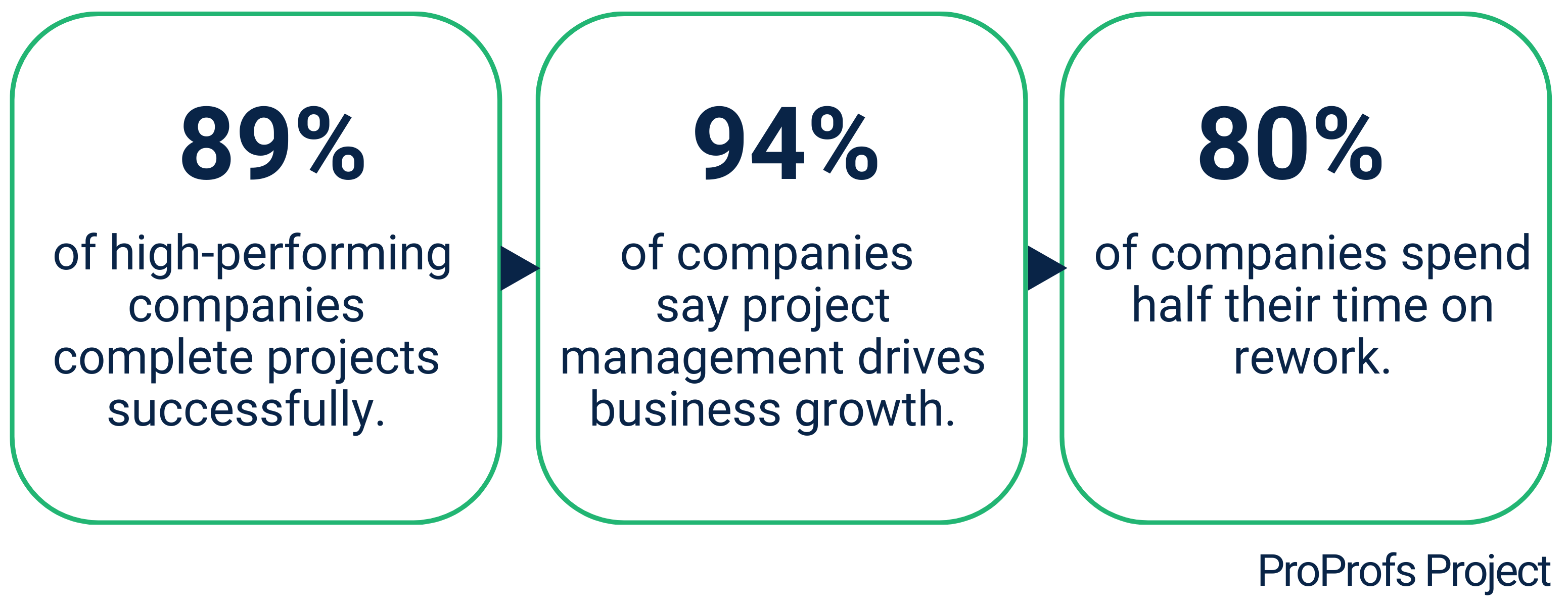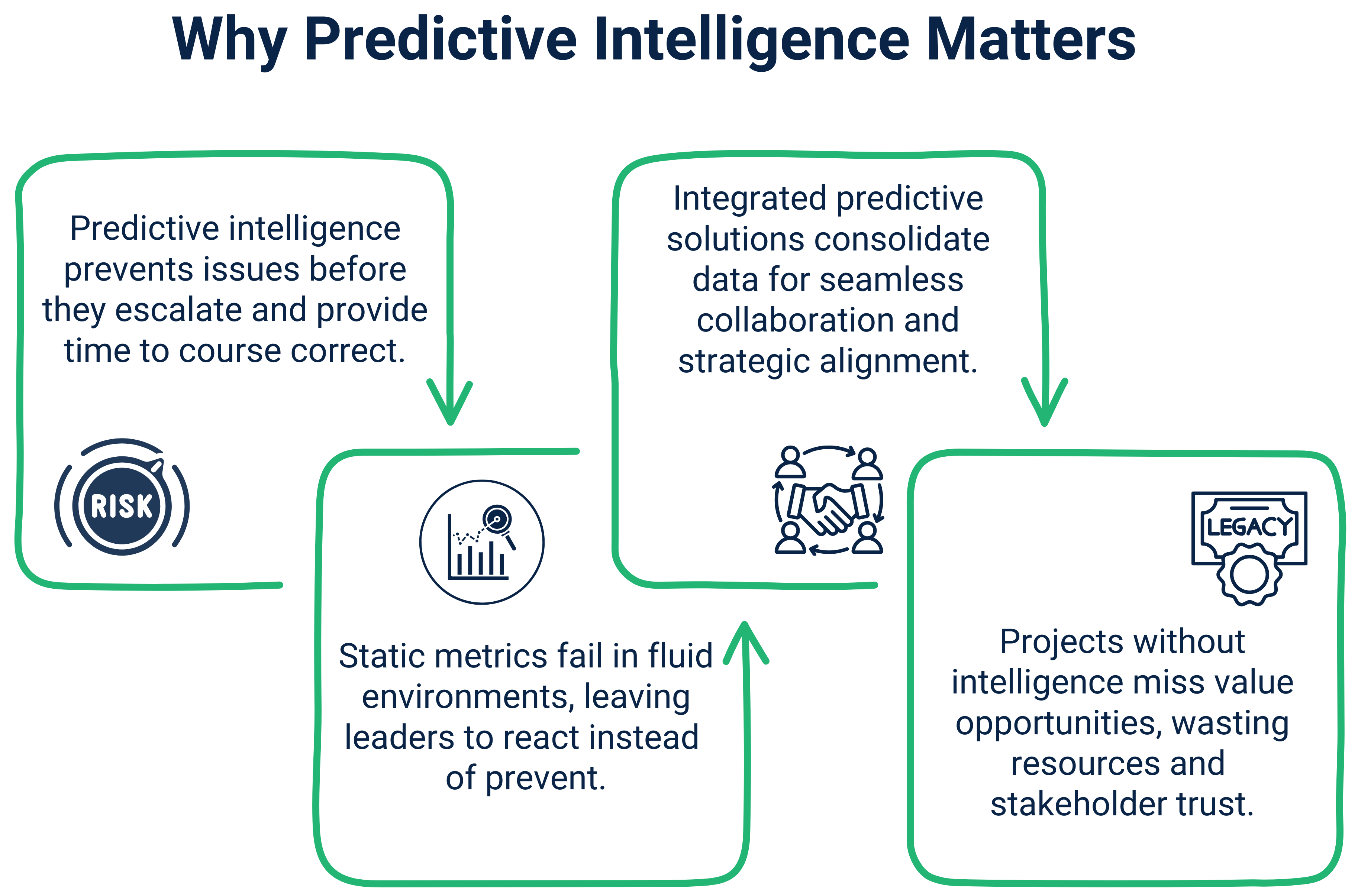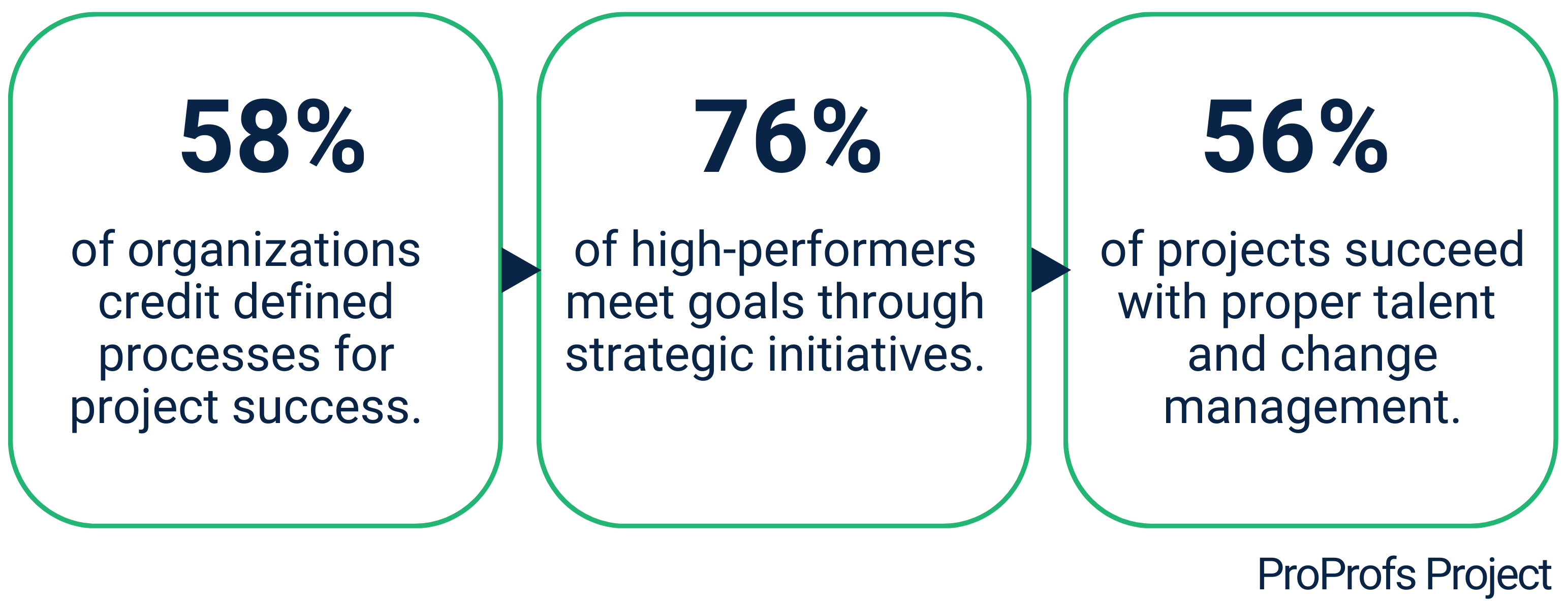

For decades, we’ve focused on familiar talking points: defining success criteria, setting clear goals, tracking KPIs, and aligning time, cost, and scope. These principles laid the foundation for systematic project management. While still essential, they have become static relics in a world where projects are more dynamic, complex, and high-stakes than ever before. Traditional success markers are no longer enough in an environment defined by constant change.
Today, leaders are asking a sharper question: What comes next?
It’s no longer enough to meet budgets, timelines, or even stakeholder expectations. Project success criteria must now extend beyond the immediate and tangible; it must address resilience, adaptability, and long-term value. It’s about building systems that predict outcomes and correct course proactively, ensuring every project isn’t just completed but thrives in an ever-changing environment.
This article explores how predictive intelligence redefines the IT project success. By anticipating risks and turning data into actionable insights, it helps leaders move from reactive problem-solving to proactive, strategic success. Let’s uncover how foresight and intelligence drive the factors of project success with practical, actionable strategies.
The Missing Link: Predictive Intelligence in Project Success
Traditional project management tools provide visibility—dashboards, project success metrics, and progress reports that show where your project stands, not where it’s heading. But visibility without intelligence is just noise. It highlights what’s happening but doesn’t explain why, flags delays without predicting them, and identifies risks too late for effective mitigation. Leaders need more than observation; they need foresight—a transformation only predictive intelligence can deliver.
Predictive intelligence isn’t an enhancement; it’s the foundation of project success. It anticipates challenges, prioritizes responses, and transforms data into proactive decisions, empowering leaders to act decisively and with precision.

How predictive intelligence is changing the game:
- Anticipating Risks Before They Manifest
Predictive intelligence forecasts bottlenecks early, using trends and patterns to help leaders act decisively. - Turning Data Overload Into Actionable Insights
Predictive systems filter noise, delivering clear, prioritized insights that enable decision-makers to focus on what matters most. - Ensuring Continuous Alignment with Strategic Goals
In ever-changing environments, predictive tools track project progress and alert leaders to shifts in priorities, keeping efforts aligned with business objectives.
Predictive intelligence shifts the conversation from reaction to prevention, from hindsight to foresight, and from fragmented decision-making to strategic clarity.
Curious how predictive intelligence can revolutionize your approach? Schedule a demo today and see the impact firsthand.
Leaders who embrace this transformation will leave outdated practices behind and build a future-first approach to project success evaluation.
Why the Old Playbook Fails Modern Projects
For years, project management has relied on systems designed for simpler, more predictable times: define the scope, set a timeline, allocate resources, and track progress. While these methods provided structure, they’ve become liabilities in today’s high-stakes, fast-moving environments. The old playbook is reactionary—it waits for problems to emerge before offering solutions. This approach no longer works in a world where small delays or missteps can quickly snowball into significant setbacks.
Here’s why the traditional approach is holding projects back:
- Static Metrics Fail in Fluid Environments
Traditional metrics like scope, budget, and timelines fall short. They measure execution, not value. Modern projects demand metrics that reflect outcomes, adaptability, and long-term impact in a rapidly shifting environment. - Risk Management Is Stuck in the Past
Traditional risk strategies focus on identifying risks early and reacting later. Modern projects demand tools that anticipate risks in real-time, transforming response into prevention. - Focus on Deliverables, Not Impact
Many teams celebrate completed tasks without assessing whether they create real value. Success isn’t about completion; it’s about achieving measurable business outcomes. - Data Silos Are Costly Blind Spots
Isolated data creates gaps and delays, leading to missed opportunities. Predictive intelligence consolidates real-time information, giving leaders the clarity to make informed, timely decisions.
The weaknesses of this outdated system aren’t just inconvenient—they actively undermine success. Modern project management demands tools and strategies that provide foresight, adaptability, and the ability to act before issues escalate.
Tired of traditional tools holding you back? See TrueProject’s advanced capabilities and transform your project outcomes.
Leaders must now rethink their approach, replacing outdated practices with solutions that drive clarity and intent.

From Managing to Leading Projects: Redefining Leadership for Success
Managing a project involves structure—organizing tasks, allocating resources, and ensuring deliverables are met. Leading a project, however, is about transformation—guiding teams toward meaningful outcomes, embracing change with confidence, and achieving results that truly matter. The key difference is looking beyond immediate goals and focusing on strategic impact.
Traditional project management often limits leaders to operational oversight, centering on timelines, budgets, and task completion. Today’s leaders must go further. They need to build frameworks where teams can thrive, anticipate challenges, and make decisions driven by AI-driven insights and predictive intelligence.
Here’s how leadership evolves with predictive intelligence:
- Enabling Proactive Decision-Making
Leadership is about strategic foresight. Predictive tools highlight risks and priorities before they escalate, ensuring decisive, impactful action. - Creating Transparency Without Overload
Teams thrive on clarity, but too much data can distract. Predictive systems filter out noise, presenting only critical insights that foster trust and keep teams focused. - Fostering Accountability Without Micromanagement
Predictive systems monitor key metrics, highlighting areas needing attention without constant oversight. This empowers teams while keeping leaders strategically focused. - Aligning Execution With Vision
Great leaders don’t just manage projects; they connect them to broader organizational goals. Predictive intelligence ensures milestones and decisions align with strategic outcomes, bridging execution with vision.
Leadership today transcends task management—it builds inevitable success. Let’s now explore how predictive intelligence transforms these strategies into measurable outcomes.
Ready to lead with foresight? Schedule a strategy call and discover how TrueProject aligns your vision with results.
Practical Strategies for Integrating Predictive Intelligence
Predictive intelligence is more than a concept; it’s the foundation of modern project success factors. However, adopting it effectively is key to creating measurable impact. Leaders need actionable steps to move from theory to execution and embed predictive insights into daily practices.

Here’s how to integrate predictive intelligence effectively:
- Choose Tools With Advanced Capabilities
Select platforms that offer real-time analytics, predictive insights, and seamless integration with existing workflows. The right tools simplify operations and enhance outcomes. - Redefine Success Metrics
Expand KPIs to measure adaptability, stakeholder satisfaction, and alignment with strategic goals. Predictive intelligence uncovers patterns that drive sustained value. - Upskill Teams to Interpret Insights
Predictive systems are only as effective as their users. Train teams to analyze insights and translate them into strategies, ensuring every level of the organization benefits. - Adopt a Proactive Mindset
Shift from reacting to anticipating. Leverage predictive insights to make strategic moves before challenges escalate, keeping projects on track. - Foster Real-Time Collaboration
Share predictive insights across teams and stakeholders to ensure alignment and improve collaboration. Transparency keeps everyone focused and connected to the project’s goals.
Predictive intelligence transforms project management from reactive to proactive, aligning daily operations with long-term strategies. This integration ensures leaders not only optimize projects but also drive measurable value across their organizations.
With a clear path forward, it’s time to understand how these strategies elevate project outcomes and foster long-term success. Let’s connect the dots between predictive intelligence and sustainable project impact.
From Insights to Impact: Elevating Project Outcomes
Integrating predictive intelligence into project management isn’t just about better tools—it’s about delivering outcomes that redefine success. This approach transforms projects into strategic assets, aligning every effort with long-term value and measurable impact. The focus shifts from checking boxes to creating sustainable success.
Here’s how predictive intelligence drives outcomes:
- Minimizing Costly Surprises
Predictive systems detect risks before they escalate, allowing leaders to adjust timelines, budgets, or resources proactively. This reduces disruptions and ensures smoother execution. - Enhancing Stakeholder Confidence
Consistently delivering predictable results builds trust among stakeholders. Transparency and foresight from predictive insights keep stakeholders engaged and confident. - Delivering Value Beyond Completion
Success isn’t just completing a project—it’s achieving results that align with organizational priorities. Predictive intelligence ensures every project delivers meaningful, measurable value. - Fostering Continuous Improvement
By analyzing patterns and learning from past performance, predictive tools create a culture of ongoing improvement, enabling smarter decisions in future projects.
Predictive intelligence takes project management from tactical execution to strategic impact. It’s about doing more than meeting goals—it’s about exceeding expectations. Let’s now explore how integrating these strategies across an organization solidifies a future-ready project management framework.
Integrating Predictive Intelligence into Strategy
Predictive intelligence is not just a project-level solution; it’s a strategic lever that connects execution with business objectives. When fully integrated, it ensures that every project decision drives organizational growth and competitive advantage.
Here’s how predictive intelligence enhances strategy:
- Making Smarter Decisions, Faster
Predictive insights give leaders clarity on what actions align with strategic priorities. This eliminates guesswork and accelerates decision-making. - Achieving Agility Without Chaos
Rapidly shifting priorities no longer derail progress. Predictive tools help leaders decide which projects to prioritize, adjust, or stop, ensuring agility without disruption. - Optimizing Resources for Growth
Predictive intelligence reveals inefficiencies and optimizes resource allocation, ensuring time and budgets are used effectively to maximize returns. - Building Collaboration Through Alignment
Unified insights ensure teams, departments, and stakeholders remain aligned, reducing friction and enhancing overall efficiency. - Turning Projects Into Competitive Advantages
By aligning execution with strategic goals, predictive intelligence transforms projects into measurable assets that drive long-term success.
Predictive intelligence bridges the gap between strategy and execution, ensuring every project serves the larger business vision. This integration is the foundation for sustained success in today’s rapidly evolving business environment.
Don’t just plan projects—lead them to success. Take the next step with TrueProject’s predictive intelligence platform.
Conclusion: Redefining Success Starts With Redefining Leadership
Project success is no longer about repeating outdated methods or relying on shallow metrics—it demands a complete rethinking of leadership. The era of reactive adjustments and surface-level achievements is over. Leaders must adopt predictive intelligence as the new standard to move from uncertainty to informed action, from reaction to anticipation, and from maintaining to thriving.
Modern projects call for solutions that turn complexity into clarity, align efforts with strategic priorities, and consistently deliver measurable value. Anything less drains resources, risks setbacks, and fails to meet the demands of today’s dynamic environments.
For leaders ready to elevate their approach, the old frameworks are no longer enough. Predictive intelligence isn’t just an improvement—it’s the future of project success. TrueProject, a KPI-driven predictive SaaS solution for project management, embodies this transformation, equipping leaders with the foresight, insights, and alignment needed to ensure every project creates meaningful impact.
The Next Step: Predictive Intelligence in Action
TrueProject brings clarity to execute projects with efficiency and accurate foresights. It delivers early risk insights, data-driven guidance, and KPI tracking that genuinely supports decisions with foresight. With straightforward, actionable intelligence that helps teams stay on course and achieve meaningful outcomes. TrueProject ensures every project deliver value and meaningful business impact. For leaders who value precision, relevance, and consistency, TrueProject stands apart as the solution that doesn't just report—it empowers.
See how it can change the way you lead—schedule your demo today, and experience project success redefined.






